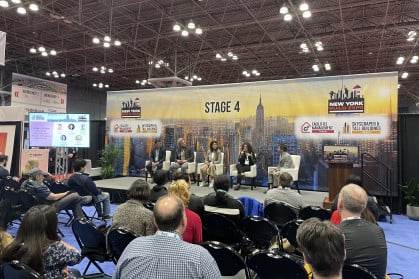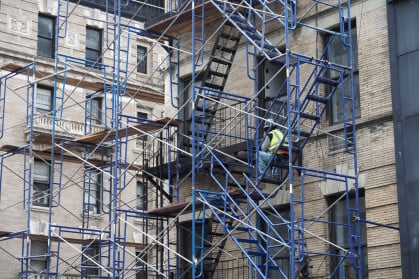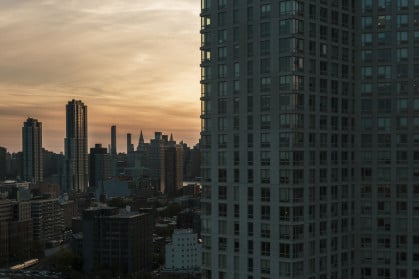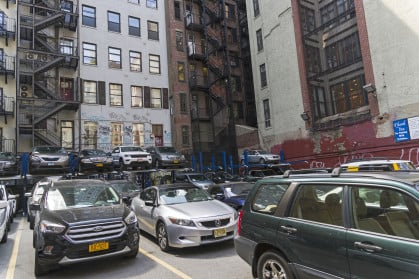New year, new worries: What condo and co-op boards are watching in 2024
- Most buildings will need to comply with Local Law 97 and undergo a parapet inspection
- Higher costs for insurance is putting pressure on building’s budgets and monthly fees
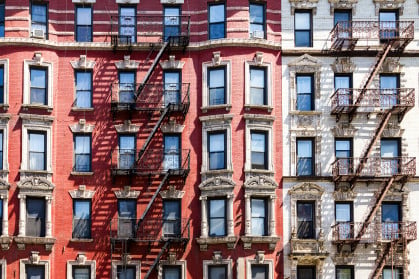
Buildings with parking garages and parapets may need to meet new inspection requirements this year.
iStock
The new year is usually a time for new beginnings, but for New York City condo and co-op boards, 2024 brings a host of fresh concerns.
It’s no secret that condo and co-op buildings had a tough 2023. Rising monthly fees and insurance costs put pressure on building’s budgets, while new city and state legislation present challenges for buildings. And 2024 promises much of the same.
“There's a lot of city-driven initiatives that are going to affect the vast majority of our portfolio and those are the things that boards are really cognizant of, to ensure that they can have the money and the wherewithal to fund and do the work properly,” says Mark Levine, the principal at the NYC property management firm EBMG.
Boards should be familiar with some of those initiatives, such as Local Law 11, which requires properties to undergo a facade inspection every five years. But as of 2024, buildings have a handful of new rules to follow when it comes to examining their infrastructure or meeting the city’s carbon emissions limits.
Read on for a few key laws and budget line items boards will be watching in 2024.
Local law headaches
After much debate, one of the city’s most significant environmental laws—Local Law 97— will finally take effect this year. Buildings above 25,000 square feet need to meet the law’s greenhouse gas emissions limits or face escalating fines through 2050.
Most condo and co-op buildings should already be in compliance with the 2024 to 2029 carbon emissions limits, but those that aren’t will see fines of $268 per metric ton of carbon dioxide emitted above the law’s caps. Your board can calculate its potential fines through the Building Energy Exchange’s emissions calculator, and should have already completed a decarbonization plan and an energy audit, or need to do so as soon as possible.
While Local Law 97 has garnered a lot of headlines, there are a handful of other laws your board needs to be aware of in 2024. Almost all NYC buildings will need to have their parapets checked for dangerous conditions under Local Law 126 this year. That’s on top of the Façade Inspection & Safety Program mandated by Local Law 11, which requires facade inspections for buildings over six stories tall every five years.
The parapet law covers any building with a parapet that fronts a public right-of-way, so it’s likely your building would fall under its scope.
And Local Law 126 also means many buildings will also need to have their parking garages inspected before August of this year, under stricter requirements from the NYC Department of Buildings. The DOB revised its rules in October, mandating that many buildings perform an initial inspection ahead of a final report, or file the final report sooner.
Last but not least, your board should make sure its apartment application is up to date, says Rebecca Poole, the director of membership and communication for the Council of New York Cooperatives & Condominiums (CNYC). Laws passed last year strengthened regulations against lead paint and required apartment sellers to disclose if their building has a history of flooding.
“I think buildings should look at their entire application process, the application itself, and then make sure that it's all in compliance with new regulations,” Poole says.
Rising cost of insurance
Both property and umbrella insurance premiums rose in 2023, and 2024 promises to be another tough year, Levine says.
“Insurance is really tough right now,” Levine says. “The programs are not really in the benefit of the building. You're getting a lot less coverage for more premium.”
There’s a handful of reasons insurance costs have spiked in NYC. Reinsurance companies, which protect insurers from high claims, have raised their rates. The cost of the labor and materials it takes to fix a building have risen. And extreme weather has led to more claims, putting pressure on insurers to raise their rates to meet the larger payouts.
Your board should expect an increase, but there are a few steps you can take to bring down costs: keep up with building repairs, make sure your vendors have insurance, and take a hard look at your policy before your renewal meeting.
“Buildings should be proactive when they need to bid out the insurance and they need to follow up and make sure that they get bids in advance,” Poole says. “They need to have real discussions about what is and what isn't included in their policies. But there are some things they can't control. The prices have gone up.”
Expenses pile up
Board members, property managers, and building advisors are all watching building expenses in 2024.
Insurance, inflation, and construction and inspections required by city law have helped hike expenses at buildings, putting pressure on boards to hike maintenance fees and common charges by around 10 percent, says Mark Foley, co-founder and president of the Folson Group, a condo and co-op consultancy firm.
“Across the board, we’re seeing on average this year, maintenance going up by 10 or even 15 percent,” Foley says. “There are people who have had to sell their apartments because they can't afford the maintenance increase.”
Co-ops, in particular, face a tough financial environment. Buildings that need to refinance their underlying debt will have to contend with higher interest rates, though the Federal Reserve indicated that it would lower rates in 2024 as inflation has eased.
“Any building that is due to refinance is really going to have a difficult situation based on interest rates,” says Michael Wolfe, chair of the Real Estate Board of New York’s residential management council and a board member of CNYC. “But if your mortgage is coming due, you have to refinance, [and] that's going to hurt your operating budget.”
More need to control costs
When it comes down to it, “you have to balance the books,” says Will Kwan, a managing partner at EZ Election Solutions, which advises condo and co-op buildings on elections and annual meetings.
All buildings can take steps to keep expenses down. Tina Larson, co-founder of the Folson Group, recommends doing an assessment of the building’s systems so your board knows exactly what work needs to be done and taking a proactive approach to repairs to keep costs down in the future. Your board can also update its reserve study and capital plan.
Getting ahead on maintenance will help your board make the most out of its budget, says Corinne Arnold, a managing partner at EZ Election Solutions.
“It always makes sense to do proactive maintenance when you’re already doing maintenance to make that dollar stretch as far as possible,” Arnold says. “Proactive maintenance is where it's important to save money in the long term, even though you're spending more in the immediate term.”
An uncertain (legislative) future
There’s always the risk that future legislation could expand the number of buildings that have to comply with city laws—like requiring more properties to undergo facade inspections or meet carbon emissions limits, Levine says.
“We’re starting to have conversations with a lot of our clients, that yes, they’re not in the bracket now of having to comply with [Local Law 97], but the way that the industry and the city is looking at these things we could imagine that it would [later] apply,” Levine says.
For example, the City Council passed a bill in December that would limit the use of criminal background checks in determining who could rent or purchase an apartment. The legislation would take effect on Jan. 1st 2025, although Mayor Eric Adams has yet to sign it.
Sign Up for our Boards & Buildings Newsletter (Coming Soon!)
Thank you for your interest in our newsletter. You have been successfully added to our mailing list and will receive it when it becomes available.


















